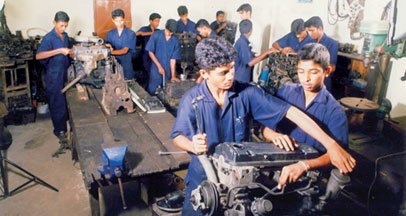Vocational training contributes to GDP growth
Marginalised men and women in the workplace and society possess
tremendous potential to further Sri Lankan society and the country's
economy.
Training them in specific skills not only provides them with access
out of poverty, but contributes to the growth of national GDP. The
recent 'PRET OPTIONS' Achievements and Lessons Learned Conference
organised in Colombo by World University Services of Canada (WUSC)
noted.
The workshop was the culmination of twenty four years of WUSC
involvement in Sri Lanka. The event shared lessons learned, good
practices, and achievements of WUSC and partner efforts, in support of
employment skills training for marginalised men and women across the
country.
 The Minister of Youth Affairs and Skills Development Dullas
Alahapperuma was the chief guest. High Commissioner of Canada Shelley
Whiting and WUSC, Executive Director Chris Eaton were also present. The Minister of Youth Affairs and Skills Development Dullas
Alahapperuma was the chief guest. High Commissioner of Canada Shelley
Whiting and WUSC, Executive Director Chris Eaton were also present.
WUSC Country Director, Richard Bonokoski, delivered the welcome
address. Since 1989, WUSC has helped marginalised or disadvantaged youth
and women acquire skills and gain employment in areas such as carpentry,
masonry, mechanics and electronics.
These skills form the backbone of any country's development as they
are skills that are always in demand. Through such initiatives,
recipients of training are able to support themselves and their
families.
Bonokoski said, "We've found that connecting families with employers
and with employment sites, such as hotels, factories, and shops can help
alleviate family concerns about safety and security of young women."
Life skills such as money management, nutrition, health, small
business development, and gender equality awareness are also taught.
In fact, WUSC helps women find higher income jobs that increase their
visibility and it promotes social acceptance of women in non-traditional
jobs.
One highlight of the conference was a performance by the theatre
group, Mathra, exemplifying the work WUSC and its partners have done for
disadvantaged young men and women in Sri Lanka. The drama, 'Deluge', was
about two young women, one Sinhalese, the other Tamil, and their quest
for a brighter future through training and employment.
Minister Alahapperuma said, "For Sri Lanka to become a middle income
country, the training and education of the 'youth' must play a
significant part."
"There is an inverse relationship between poverty and skills
formation. When skills are formed, poverty declines," he said. He said
expansion of skills development has led to a 41% reduction in poverty.
However, there are still many challenges ahead, for example, the
social stigma associated with certain trades. Due to a caste system that
still affects the outlook of many Sri Lankans, some trades are socially
limited to certain people and communities.
The Ministry and the Tertiary and Vocational Education Commission
(TVEC), have brought quality vocational training to people who need
them, especially in rural areas.
The Minister quoted a Canadian hockey great, Wayne Gretzky, 'You miss
100% of the shots you don't take'. Opportunities must be seized, he
said.
The Executive Director of the Kavantissa Vocational Institute, the
Venerable Dr. Devalegama Dhammasena Thera said that the Institute's
partnership with WUSC, initiated in 1992, resulted in improved
opportunity for hundreds of marginalised young women and men and in the
24 years since its inception, PRET has provided training to
approximately 30,000 Sri Lankan youth.
PRET has also enhanced the capacity of 47 training institutions to be
better able to deliver quality vocational training and helped in the
setting up of women's groups that identify and address specific gender
issues.
Some of the lessons learnt that were shared at the conference were
that labour market information is key to identifying appropriate areas
for skilled trade training and that private sector involvement enhances
the relevance of training.
Greater collaboration between stakeholders (government, NGOs,
community organisations, private sector) improves delivery of training
and increases employment potential.
The findings also noted that a holistic approach that includes life
skills and entrepreneurship skills with vocational training, results in
higher employment rates. |

